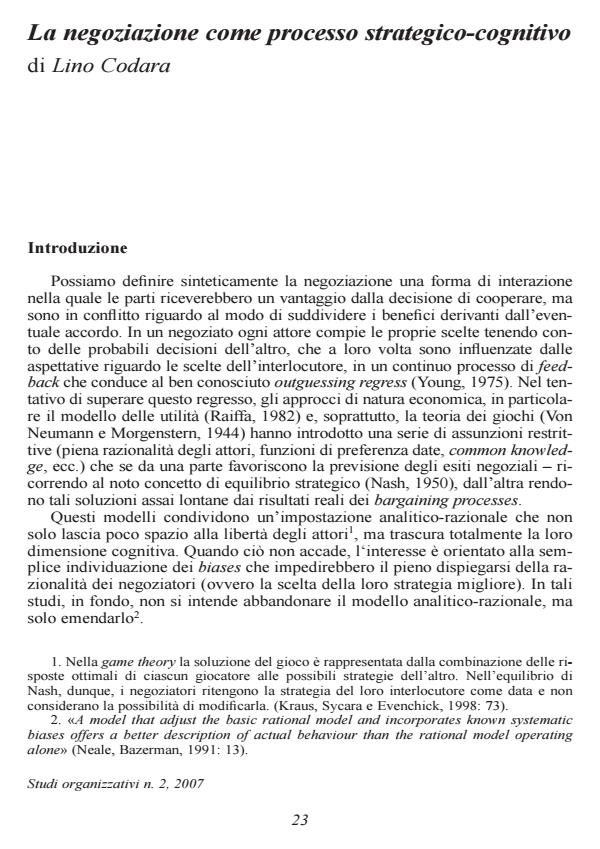La negoziazione come processo strategico-cognitivo
Titolo Rivista STUDI ORGANIZZATIVI
Autori/Curatori Lino Codara
Anno di pubblicazione 2007 Fascicolo 2007/2
Lingua Italiano Numero pagine 29 P. 23-51 Dimensione file 101 KB
DOI
Il DOI è il codice a barre della proprietà intellettuale: per saperne di più
clicca qui
Qui sotto puoi vedere in anteprima la prima pagina di questo articolo.
Se questo articolo ti interessa, lo puoi acquistare (e scaricare in formato pdf) seguendo le facili indicazioni per acquistare il download credit. Acquista Download Credits per scaricare questo Articolo in formato PDF

FrancoAngeli è membro della Publishers International Linking Association, Inc (PILA), associazione indipendente e non profit per facilitare (attraverso i servizi tecnologici implementati da CrossRef.org) l’accesso degli studiosi ai contenuti digitali nelle pubblicazioni professionali e scientifiche.
The models most used by scholars and which find the widest echo in the manuals and in managerial formation utility model, game theory share an analytical rational paradigm that not only leaves little space for the bargainers’ freedom, but also neglects their cognitive dimension. In the studies where this does not occur, the interest is centred simply on the discovery of the biases which could impede the full unfolding of the bargainers’ rationality. The article reconsiders the most important contributions in the bargaining literature in order to sketch out a richer and more articulate model of a strategic-cognitive nature. According to such a model, the most important bargaining decisions that the bargainers assume, are taken on the representations of the situation which they derive directly from their belief systems; during the bargaining the parties do not only reply to the moves and the strategies of their interlocutors so discovering the true structure of the game in a simply adaptive perspective but they also act strategically in order to construct their field of action, redefining both their own stakes and bargaining power. This view restores freedom and responsibility to the bargainers and involves their ability to construct effective representations, to activate analogies and metaphors capable to give a structuring (or to provoke a re-structuring) of the game which promote positive outcomes. The working hypotheses presented design a model with a more modest predictive capacity but with a greater capability to account for the bargaining strategies of complex parties, such to offer concrete guidelines for action and to formulate suggestions to the real bargainers, in a typically reflective theoretical perspective.
Lino Codara, La negoziazione come processo strategico-cognitivo in "STUDI ORGANIZZATIVI " 2/2007, pp 23-51, DOI: